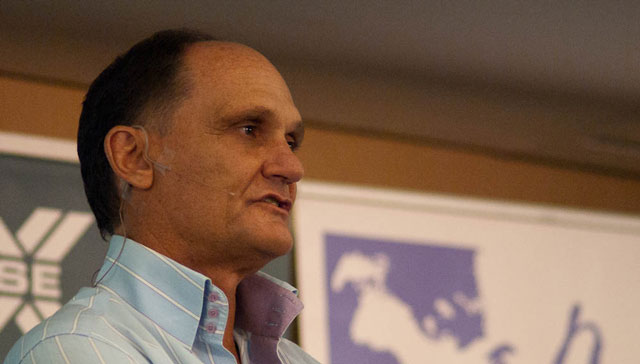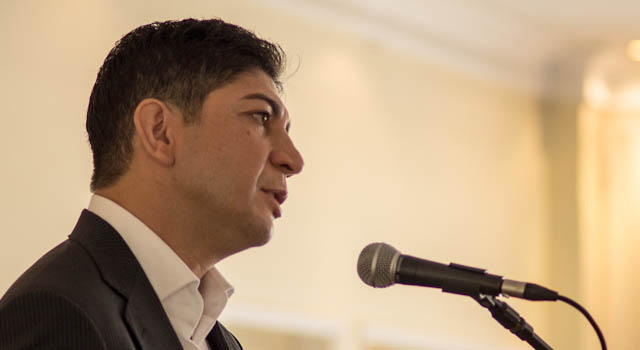
The constitutional court’s scathing judgment that ordered Vodacom to compensate Nkosana Makate for his “please call me” idea, in theory, brings an end to a legal case akin to a David vs Goliath battle.
The case, which was before the high court in Johannesburg — later appealed to the supreme court of appeal and finally the constitutional court — has dragged on for nearly 10 years in compensating Makate for the innovation.
However, the nub of the case was a dispute between two parties with an unequal bargaining power — typical of an underdog taking a telecommunications giant to task.
The backstory on the case is important to unpack.
It all started with a love affair in 2000 when Makate’s girlfriend (now wife) was a student at the University of Fort Hare in the Eastern Cape and had no money for airtime. A long-distance relationship, the lack of airtime and several communication hurdles sparked the idea for “please call me”, a free service that allows a user without airtime to send a text to be called back.
Makate, a Vodacom trainee accountant at the time, consulted his superior and mentor Lazarus Muchenje about “please call me”, who then advised him to speak to board member and director of product development and management Philip Geissler. Makate’s discussion with Geissler led to the idea being captured in a proposal and concept document.
Negotiations then followed between Makate and Geissler that Vodacom would use the “please call me” and put the idea on trial for commercial viability. In an oral agreement, Geissler agreed to pay Makate a 15% share of the revenues Vodacom would generate from the innovation if it was technically and financially viable.
Vodacom in 2001 went to market with “please call me”, which was a game changer for South Africa’s fledgling telecoms sector.
In a Vodacom internal newsletter and magazine, Makate was praised for his innovative thinking. It read: “Vodacom has launched a new product called ‘call me’, thanks to Kenneth [Nkosana] Makate from our finance department. Kenneth suggested the service to the product development team, which immediately took up the idea… ‘Call me’ has been a big success.”
Despite its success, Vodacom did not negotiate compensation with Makate. In fact, the then-Vodacom CEO Alan Knott-Craig in his autobiography Second is Nothing claimed to have come up with “please call me” when he observed two security guards from a balcony trying to call each other without having airtime.

The initial legal dispute for Makate to be compensated began in 2008 and the high court case, presided by judge Phillip Coppin, subsequently concluded that Makate had successfully proved the remuneration agreement between him and Geissler. The court also rejected Knott-Craig’s version of being the brains behind “please call me”.
However, Coppin dismissed Makate’s claim on the basis that he did not prove that Geissler did have ostensible authority to bind Vodacom in an agreement for compensation. The court also found that Makate’s claim against Vodacom had expired (a term known in legal circles as prescription, documented in the archaic Prescription Act 68 of 1969), as he did not file the claim within three years of Vodacom going to market with “please call me”. Makate appealed the ruling which was later upheld by the supreme court.
Constitutional court findings
However, at the constitutional court, Vodacom’s case went downhill. On Tuesday, justice Chris Jafta did not mince his words in his majority judgment when describing Vodacom’s actions.
As Jafta put it: “In not compensating the applicant [Makate] … Vodacom associated itself with the dishonourable conduct of its former CEO, Mr Knott-Craig and his colleague, Mr Geissler. This leaves a sour taste in the mouth. It is not the kind of conduct to be expected from an ethical corporate entity.”
He continued: “The service had become so popular and profitable that revenue in huge sums of money was generated, for Vodacom to smile all the way to the bank. Yet it did not compensate the applicant [Makate] even with a penny for his idea.”
Although the constitutional court found that it was neither necessary nor justified to interfere with the factual findings made by the high court and supreme court of appeal, it overturned the ruling of both courts.

On the matter of ostensible authority, Jafta found that given Geissler’s position at Vodacom, he “held the power to consider new products”.
“He [Geissler] was not only Vodacom’s frontman in its dealings with third parties in relation to new products but … as the evidence suggested, he could make or break any new product.”
In this regard, the court found that Vodacom had created the appearance that Geissler had the authority to enter into and reach an agreement with Makate on Vodacom’s behalf.
On prescription, Jafta said it should be interpreted in line with the constitution. He raised section 39 (2) of the constitution, which stipulates that any legislation must promote the spirit, purport, and objects of the bill of rights.
The Prescription Act bars anyone from pursuing litigation for a claim after three years has lapsed “from the date on which the debt arose”. Jafta said “debt” must be viewed as an obligation to pay money, deliver goods, or render services. In the case of Makate he didn’t “ask to enforce any of these obligations”.
“Instead, he requested an order forcing Vodacom to commence negotiations with him for determining compensation for the profitable use of his idea.” Thus, prescription does not apply.
Matter is still ongoing
It seems like the matter will be ongoing even after the court ordered Vodacom to negotiate “in good faith” with Makate to determine a “reasonable compensation” for his innovation. But justice Jafta warned: “They are not allowed to enter into those negotiations just to go through the motions. For that would not be what they have agreed to do but a charade. Both sides must enter into negotiations with serious intent to reach consensus.”
He further ordered Vodacom to commence negotiations within 30 days.
Millions if not billions of rand are at stake. Makate believes “please call me” has generated R70bn for Vodacom since its inception and he wants a 15% cut. If consensus can’t be reached on compensation, then Vodacom’s CEO — Shameel Joosub — must determine the compensation amount. Vodacom said it is still studying the judgment.
After the judgment, arguments have been raised about whether it will have a bearing on intellectual property rights in South Africa — whether innovations produced belong to the company employing you and forms part of your line of work. Furthermore, it has raised questions about whether being paid a salary constitutes as compensation or whether one should enter negotiations for separate revenue share once the product has been introduced to the market.
The jury is still out.
- This article was originally published on Moneyweb and is used here with permission

